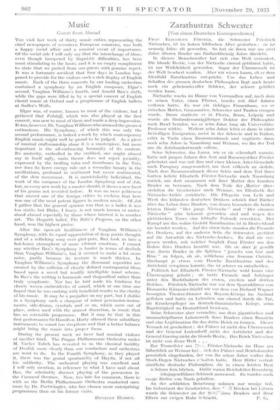Music Guests from Abroad
Tan visit last week of thirty music critics, representing the chief newspapers of seventeen European countries, was both a happy social affair and a musical event of importance. Of the social side I will only say that the interchange of ideas, even though hampered by linguistic difficulties, has been most stimulating to the hosts, and it is no empty compliment to state that we parted from our guests with genuine regret. It was a fortunate accident that four days in London hap- pened to provide for the visitors such a rich display of English music. Each of the three concerts by our leading orchestras contained a symphony by an English composer, Elgar's second, Vaughan Williams's fourth, and Arnold Bases sixth, while the gaps were filled in by a special concert of English choral music at Oxford and a programme of English ballets at Sadler's Wells.
Elgar was, of course, known to most of the visitors, but gathered that Falstaff, which was also played at the first concert, was new to most of them and.made a deep impression. It was, however, Dr. Vaughan Williams who aroused the greatest enthusiasm. His Symphony, of which this was only the second performance, is indeed a wosk. by which contemporary English music might well be proud to be judged. As a piece Of musical craftsmanship alone it is a masterpiece, but more important is the all-embracing humanity of its content. Its austerity, embodied in the crabbed, one might almost say in itself ugly, main theme does not reject joviality, expressed by the trolling tuba and trombones in the Trio, nor does its fierce energy rule out a recondite beauty in the meditations, profound in sentiment but never sentimental, of the slow movement. It is unmistakably individual, the work of the composer of the London Symphony and of Job, but, as every new work by a master should, it shows a new facet of his genius not revealed before. It was no mete politeness that moved one of the foreign critics to exclaim that here was one of the most potent figures in modern music. Of Job I gather that the general opinion was that as a ballet it was too static, tart Blake, I fancy, is not much known or under- stood abroad especially by those whose interest is in another art. The Hogarth ballet, The Rake's Progress, on the other hand, won the highest praise.
After the open-air healthiness of Vaughan Williams's Symphony, with its equal appreciation of deep poetic thought and of a rollicking song over pint-pots, Bax took us into a hot-house atmosphere of more vibrant emotions. I cannot say whether Bak's Symphony is louder in terms of decibels than Vaughan Williams's, but it seemed to make a lot more noise, partly because its texture is much thicker. In Vaughan Williams's Symphony the dissonant asperities are created by the collision of clearly defined contrapuntal ideas based upon a novel but readily intelligible tonal scheme. In Bax's the writing is harmonic and rhapsodical rather than truly symphonic. Nor has he laid aside his fondness for closely woven embroideries of sound, which at one time one hoped that he was curbing with beneficial results to the clarity of his music. It may be a prejudice on my part., but I dislike in a Symphony such a clangour of minor percussion-instru- ments, side-drums, cymbals and so on, which seem out of place, unless used with the utmost discretion, in music that has no ostensible programme. But it may be that in this first performance Sir Hamilton Harty allowed these subsidiary instruments to sound too strepitous and that a better balance might bring the music into proper focus.
During the present week we have had musical visitors of another kind. The Prague Philharmonic Orchestra under M. Vaclav 'ranch has revealed to us the classical lucidity of Dvotelc more clearly than our conductors and orchestras are wont to do. In the Fourth Symphony, as they played it, there was the genial spontaneity of Haydn, if not all
his sublimity. The orchestral playing was .excellent and I will only mention, in reference to what I have said about Bax, the admirably discreet playing of the percussion in. the Carnaval Overture. Now, too late for comment, there is with us the Berlin Philharmonic Orchestra conducted once more by Dr. Furtwangler, who has chosen more enterprising programmes than on his former visits.
DYNELEY HUSSEY.












































 Previous page
Previous page